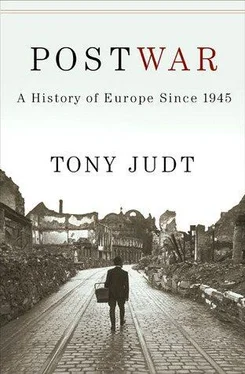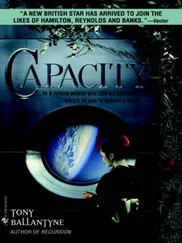Thus despite being in many ways the most western of ‘eastern’ European countries—with a historically pluralist political culture, a significant urban and industrial sector, a flourishing capitalist economy before the war and a Western-oriented social-democratic policy after it—Czechoslovakia was also the Soviet Union’s closest ally in the region after 1945, in spite of losing its easternmost district of sub-Carpathian Ruthenia to Soviet territorial ‘adjustments’. That is why Beneš, alone of the east- and south-east European wartime prime-ministers-in-exile, was able to bring his government home—where, in April 1945, he reconfigured it with seven Communists and eleven ministers from the other four parties.
The Czech Communists under their leader Klement Gottwald genuinely believed that their chances of coming to power through the ballot box were good. They had made a respectable showing at the last pre-war Czechoslovak elections, obtaining 849,000 votes (10 percent of the total) in 1935. They were not dependent on the Red Army, which withdrew from Czechoslovakia in November 1945 (though in Prague as elsewhere the Soviet Union maintained a significant intelligence and secret police presence through its diplomatic establishment). In the genuinely free, albeit psychologically fraught Czechoslovak elections of May 1946, the Communist Party won 40.2 percent of the vote in the Czech districts of Bohemia and Moravia, 31 percent in largely rural and Catholic Slovakia. Only the Slovak Democrat Party did better, and its appeal was by definition confined to the Slovak third of the population. [35] The Agrarian Party in the Czech lands and its partner, the People’s Party in Slovakia, were banned after the war for connivance with Nazi policies.
The Czech Communists anticipated continuing success, which is why they initially welcomed the prospect of Marshall Aid and undertook recruitment drives to bolster their prospects at future polls—party membership of some 50,000 in May 1945 rose to 1,220,000 in April 1946 and reached 1,310,000 in January 1948 (in a national population of just 12 million). The Communists were certainly not beyond using patronage and pressure to secure support. And, as elsewhere, they had taken the precaution of obtaining the vital ministries and placing their men in crucial positions within the police and elsewhere. But in anticipation of the elections of 1948 the homegrown Communists of Czechoslovakia were preparing to come to full power by a ‘Czech road’ that still looked quite different from those to the east.
Whether the Soviet leadership believed Gottwald’s assurances that the Czechoslovak Communist Party would triumph unaided is unclear. But at least until the autumn of 1947 Stalin left Czechoslovakia alone. The Czechs had expelled the Sudeten Germans (which exposed them to German hostility and thus made their country even more dependent on Soviet protection) and the emphasis in Beneš’s post-war governments on economic planning, state ownership and hard work reminded at least one French journalist in May 1947 of the rhetoric and mood of early Soviet stakhanovism. Prague billboards carried portraits of Stalin alongside those of President Benes himself, long before the Communists had even established a government of their own, much less secured a monopoly of power. We have seen that Foreign Minister Jan Masaryk and his colleagues did not hesitate, in the summer of 1947, to decline Marshall Aid at Moscow’s behest. Stalin, in short, had nothing to complain of in Czechoslovak behaviour.
Nevertheless, in February 1948 the Communists engineered a political coup in Prague, taking advantage of the imprudent resignation of non-Communist ministers (over an important but obscure issue of Communist infiltration of the police) to seize control of the country. The Prague coup was of enormous significance, precisely because it came in a more or less democratic country that had seemed so friendly to Moscow. It galvanized the Western allies, who inferred from it that Communism was on the march westwards. [36] Western public opinion was also influenced by Masaryk’s death on March 10th 1948—he was reported to have ‘fallen’ from his window into the courtyard of the Foreign Ministry. The exact circumstances of his death have never been elucidated.
It probably saved the Finns: thanks to the problems that the Czech coup caused him in Germany and elsewhere, Stalin was forced in April 1948 to compromise with Helsinki and sign a Friendship Treaty (having initially tried to impose on Finland an eastern-European solution by splitting the Social Democrats, forcing them to merge with the Communists in a ‘Finnish People’s Defense League’—and thus bringing the latter to power).
In the West, Prague awoke Socialists to the realities of political life in eastern Europe. On February 29th 1948 the ageing Léon Blum published in the French Socialist paper Le Populaire a hugely influential article, criticizing western Socialists’ failure to speak out about the fate of their comrades in eastern Europe. Thanks to Prague, a significant part of the non-Communist Left in France, Italy and elsewhere would now firmly situate itself in the Western camp, a development that consigned Communist parties in countries beyond Soviet reach to isolation and growing impotence.
If Stalin engineered the Prague coup without fully anticipating these consequences, it was not just because he had always planned to enforce his writ in a certain way throughout the bloc . Nor was it because Czechoslovakia mattered much in the grand scheme of things. What happened in Prague—and what was happening at the same time in Germany, where Soviet policy was moving swiftly from stonewalling and disagreement to open confrontation with her former allies—was a return by Stalin to the style and strategy of an earlier era. This shift was driven in general terms by Stalin’s anxiety at his inability to shape European and German affairs as he wished; but also and above all by his growing irritation with Yugoslavia.
…
In 1947, the Communist government in Yugoslavia under Josip Broz Tito had a unique status. Alone of the Communist parties in Europe, the Yugoslavs had come to power by their own efforts, depending neither on local allies nor foreign help. To be sure, the British in December 1943 had stopped sending aid to the rival Chetnik partisans and had swung their support behind Tito, and in the immediate postwar years the United Nations Relief and Rehabilitation Administration (UNRRA) spent more money (US$415 million) in aid to Yugoslavia than anywhere else in Europe, 72 percent of that money coming from the United States. But for contemporaries what mattered was that the Yugoslav Communist partisans had fought the only successful resistance war against the German and Italian occupiers.
Buoyed by their victory, Tito’s Communists had no truck with coalitions of the kind being set up elsewhere in liberated eastern Europe and set about immediately destroying all their opponents. In the first post-war elections, in November 1945, voters were presented with an unambiguous choice: Tito’s ‘People’s Front’… or an urn publicly labeled ‘opposition’. In January 1946 the Communist Party of Yugoslavia introduced a constitution directly modeled on that of the USSR. Tito pressed forward with mass arrests, imprisonment and execution of his opponents, together with forced collectivization of the land, at a time when Communists in neighbouring Hungary and Romania were still carefully calibrating a more accommodating image. Yugoslavia, it seemed, was on the hard, cutting edge of European Communism.
On the surface, Yugoslav radicalism and the success of the Communist Party of Yugoslavia in taking firm control of a strategically crucial region appeared to Soviet advantage and relations between Moscow and Belgrade were warm. Moscow lavished unstinting praise on Tito and his party, evinced great enthusiasm for their revolutionary achievements and held Yugoslavia up as a model for others to emulate. The Yugoslav leaders in return took every occasion to insist on their respect for the Soviet Union; they saw themselves as introducing the Bolshevik model of revolution and government into the Balkans. As Milovan Djilas recalled, ‘all of us were pre-disposed towards [the USSR] in spirit. And all of us would have remained devoted to it, but for its own Great Power standards of loyalty’.
Читать дальше












